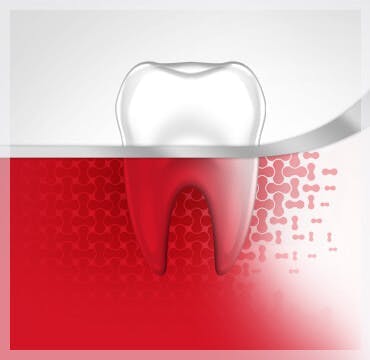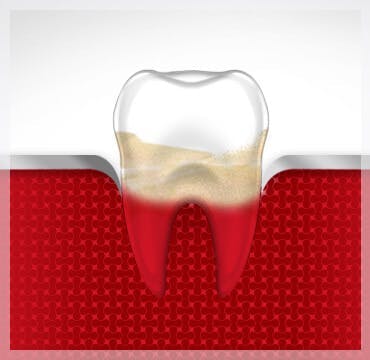While healthy gums are pink and firm, unhealthy gums appear red, inflamed and puffy. They may bleed, or feel sore when chewing or brushing your teeth. So, what causes swollen gums? While they can be caused by many things, swollen gums are typically a symptom of early gum disease.i
Other possible causes of swollen gums related to gum disease include:
- Poor dietiv, v
- Certain medicationsvi
- Smoking or chewing tobaccovii
- Hormonal changesviii
It's essential to visit your dentist if your gums are swollen, sore or bleeding. They will be able to identify the cause, as well as provide advice on the best treatment for your swollen gums.
What Causes Swollen Gums?
Gum Disease
Swollen gums can be seen in all stages of gum periodontal disease, including gingivitis (early gum disease) and periodontitis (advanced gum disease). Gum disease is a relatively common condition and, in its advanced stage, periodontitis, it affects roughly half of US adults over the age of 30.ii Periodontitis is a major cause of tooth loss in adults if left untreated. The good news is that gum disease is reversible if treated in its mildest form of gingivitis.ii
Poor Diet
A diet lacking in essential vitamins from fruits and vegetables can contribute to swollen gums if the body is not getting proper nutrients to help fight gum inflammation.iii, iv, v
Brushing or Flossing Too Hard
Brushing or flossing too vigorously may irritate the gums around your teeth and cause them to become swollen.
Certain Medications
Swollen gums or other soft tissues can be a side effect of some medications. Speak to your doctor or dentist if you are concerned the medication you are taking may be affecting your gums.vi
Smoking or Using Tobacco
Smoking cigarettes and cigars or chewing tobacco puts you at twice the risk of developing gum disease as a non-smoker, and makes it harder for your gums to heal from any infection that may be causing swollen gums.vii
Hormonal Changes
In women, hormonal changes associated with menstruation, pregnancy or menopause in the presence of dental plaque that is left on your teeth can lead to swollen gums.viii
How to Treat Swollen Gums
Brush With parodontax Toothpaste
Gingivitis is usually caused by inadequate oral hygiene, which allows plaque to build up, leading to swollen, inflamed gums.i, iii Help control plaque build-up with daily brushing and flossing twice a day with a tooth-strengthening toothpaste such as parodontax, which is 3x more effective at removing plaque* and clinically proven to help improve gum health.
Find out more about how parodontax works.
*As compared to a sodium monoflurophosphate toothpaste with regular brushing.
Improve Your Brushing Technique
Brush your teeth for two minutes twice daily. Use a soft-bristled toothbrush to gently but thoroughly clean your teeth. Pay careful attention to the gum line, where the gums and teeth meet, to help maintain gum health.ix
Use Floss or Interdental Brushes
These help to remove plaque from difficult to reach areas between your teeth. After brushing and flossing, try rinsing with a mouthwash to help remove any food particles that you may have missed.ix, x
Healthy Diet and Lifestyle
As well as improving your oral hygiene at home, lifestyle changes can help to keep your gums healthy. Cut back on sugary food and drinks, which can make your teeth more susceptible to decay. Be sure to eat a balanced and nutritious diet rich in fruits and vegetables.iv, v Quitting smoking will also help reduce your risk of developing gum disease.vii
Visit Your Dentist
Don't ignore swollen gums – particularly if they're bleeding, as this could indicate a more severe problem. Seek advice from your dentist who can identify the cause and advise the best course of action.
Learn more about the treatments available for gum disease.





